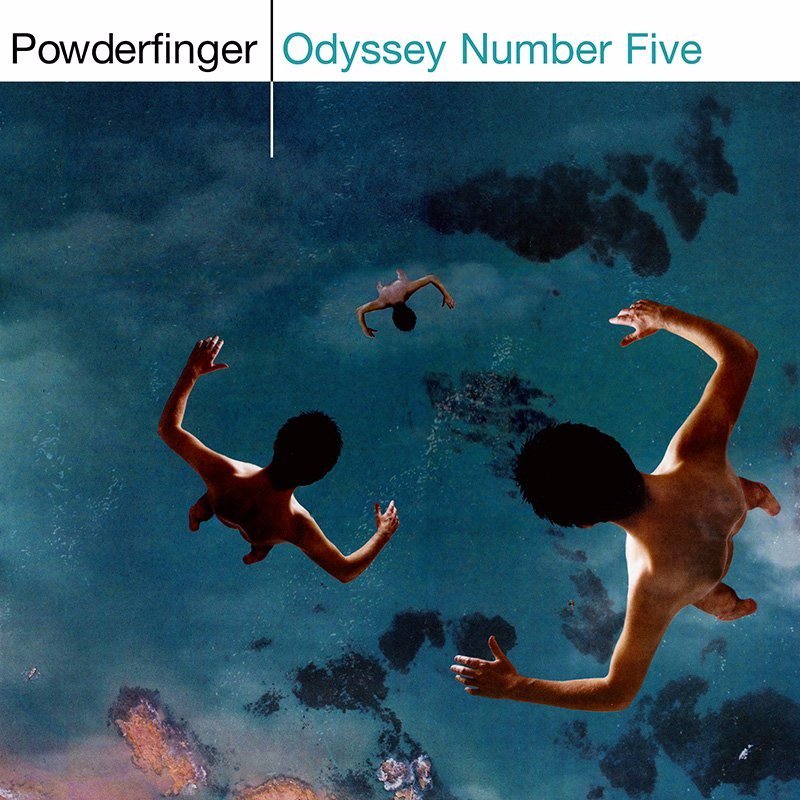We Pit Powderfinger’s ‘Internationalist’ And ‘Odyssey Number Five’ Against Each Other
Which album reigns supreme?

Music isn’t a competition, but just like in life there are winners and losers.
A couple of years back, contributor David James Young began doing side-by-side comparisons of albums by Paramore, the Gallagher brothers and even Nickelback and Stone Sour (it was a whole thing, trust us.)
So we decided to make it a bit of a thing: ‘In The Ring’ is a column in which we look at two classic albums from one beloved act to see which one fares the best when they’re put head to head.
Below, we take a look at Brisbane royalty Powderfinger — who have just announced a one-off reunion show next Saturday night — and their two best-known albums, Internationalist and Odyssey Number Five.
Internationalist is widely regarded by critics as their best work, but how does it fare when pitted against the monstrously popular, eight-times platinum popular, Odyssey Number Five? Let’s get stuck in.
Internationalist (1998)
SOUND
Internationalist is the sound of a band moving past their post-grunge roots while also making sure they don’t throw out the baby with the bathwater.
There’s plenty of progression and maturity, but they’re cautious enough to match those moments with ones that reflect their rough-edged origins, so as to not lose sight of their collective raison d’être.
In that respect, one can view Internationalist as a complementary companion piece to 1995’s Double Allergic — evidence of the country’s biggest band asserting and defining its own identity.
HIGHLIGHTS
Even if you haven’t heard Internationalist in full, there’s a very good chance you’re across some of its bigger singles.
‘The Day You Come’ is one of the band’s more political songs (rumoured at the time to be about Pauline Hanson and her rampant xenophobia) equally shrouded in ambiguity and pointed in its choice of words. Its unique guitar work and insistent drums back up Fanning’s falsetto hooks and drawn-in verse dynamics with considerable strength — and the same, by extension, can be said of a song like ‘Passenger’. There’s also the cathartic blow-out of ‘Don’t Wanna Be Left Out’ and ‘Good Day Ray’, which quite literally serve as the album’s centrepiece.
For a band invariably described by at least one of your parents as ‘nice’, it’s easy to forget how hard Powderfinger could go when the moment called for it. In moments like this, they’re a snarling pub-rock beast — and part of you wishes they’d indulged in this side a little bit more back in the day.
LOWLIGHTS
Nothing on Internationalist cries out as being explicitly bad, per se, but there are definitely a few moments that leave a little to be desired when paired up against the album’s standouts.
The gentle strut of ‘Hindley Street’ never really worked as an album opener, for starters, and would have fared better somewhere later in the fold. ‘Over My Head’ also feels inconsequential and throwaway — even though, one could argue, that was kind of the point of its inclusion.
Not to tell the pros how to do their job or anything like that, but there’s definitely a better album with a rejigged running order in there — and it’s already a great album as is, so make of that what you will.
COMMERCIAL/CRITICAL SUCCESS
Internationalist would go on to be certified five times Platinum to Double Allergic’s three and was the first Powderfinger record to top the ARIA charts.
The lion’s share of these songs are still vital — and you can’t say that for many 20-year-old recordings.
On the subject of ARIA, the band also picked up three of the dangerously-sharp awards at the 1999 ceremony. All the while, Internationalist received some of the best reviews of the band’s career up to that point.
At the time, guitarist Ian Haug was quoted as saying he almost wanted the band to be taken down in a review, so surreal was the adulation and kudos the band were receiving.
LEGACY
Strangely, for all of its successes, Internationalist has a real underdog feel to it. Much like Double Allergic, it’s a band coming to terms with an unforeseen ascent to the top of Australian music’s food chain.
These songs couldn’t have been written with the full breadth of knowledge regarding the impact they would have — in other words, they didn’t set out to write a hit record. When Bernard Fanning made a cameo during WAAX’s set at Splendour this year, however, it’s telling they got him up for ‘Don’t Wanna Be Left Out’.
The lion’s share of these songs are still vital — and you can’t say that for many 20-year-old recordings.
Odyssey Number Five (2000)
SOUND
Consider Odyssey as the album farewelling Powderfingers’ collective 20s and entering a phase of quote-unquote “adulthood.”
Their pub days behind them, the band forged ahead with a new creative direction that, for all but one song, abandoned the straight-up rock and roll that had guided their first few releases. It’s bigger, it’s poppier and it’s more ambitious in its scope — which, as you’ll find, has its good and bad points.
HIGHLIGHTS
Paralleling Internationalist, the true standout of Odyssey is the moment Powderfinger indulge in their heavier, grittier side. The difference with ‘Like a Dog’, however, is that it doesn’t play its hand until the chorus hits with its Tom Morello-aping riff and Fanning’s gnashing, caustic vocal delivery. This exercise in bait-and-switch dynamics pays off in a big way, and still stands to this day as one of the band’s best singular efforts across their body of work.
Credit where credit’s due, however: some of the more restrained moments of the record provide highlights in their own right. ‘The Metre’ makes a strong argument for being Powderfinger’s most underrated track — its gorgeous, harmony-laden refrain plays beautifully into Daniel Delholm’s tasteful string arrangements.
Elsewhere, ‘My Kind of Scene’ paints Fanning at a vulnerable point — comparable to that of ‘Pick You Up’ — and allows for a deeper moment of introspection than the average Powderfinger ballad.
LOWLIGHTS
It’s not so much a matter of them being particularly bad songs, but where Odyssey suffers is in its overexposure. The album sports two Hottest 100 winners — the band remain the only act in the history of the countdown to achieve this feat — and both ‘These Days’ and ‘My Happiness’ have had their jerseys long retired.
The well is completely dry when it comes to these songs — it’s hard to get anything out of them anymore, and listening to them voluntarily feels like a moot point in 2018. There’s also moments on the album that weren’t even all that compelling to listen to the first time around — the title track and closer ‘Whatever Makes You Happy’ immediately come to mind.
COMMERCIAL AND CRITICAL SUCCESS
You already know the story here. Odyssey hit number one and quickly became the band’s biggest-selling LP — eight times platinum, plus their only album to ever chart in the US. They endeavoured to make in-roads stateside, including a spot on Letterman, but it obviously never quite took off in the same way it did here.
Odyssey Number Five is when Powderfinger officially graduated from your cousin’s favourite band to your uncle’s favourite band.
It’s hard to say why nowhere outside of Australia really cared for Powderfinger — even when they co-headlined the Big Day Out with Muse across the Australian dates in 2010, they were on at 5pm over in Auckland.
Perhaps they were too carved into the cultural niche, or didn’t Americanise their sound enough to score the same hype that other antipodean acts had received and would go onto receive. Really, almost two decades on it’s all pure conjecture.
All you need to know is that, as far as commercial success in their homeland was concerned, Powderfinger were all set for the rest of their days.
LEGACY
To add a familial aspect to this transition, Odyssey Number Five is when Powderfinger officially graduated from your cousin’s favourite band to your uncle’s favourite band.
Seriously, no matter how young or old your uncle is, he has a copy of Odyssey Number Five on CD. It’s like your auntie and Rumours – it’s just science. It’s a barbeque album, it’s a Sunday afternoon album, it’s a roadtrip album. If you lived in the suburbs, you were issued Odyssey Number Five.
For better and for worse, the album has become part of the furniture.
FINAL VERDICT
At the end of the day, the purpose of an investigation like In The Ring is to determine which album, pound-for-pound, is better out of two options. With that criteria in mind, the winner has to be Internationalist.
The songs primarily hold up, they haven’t been overplayed and in some cases sound like they could have come out today. Odyssey is a fine record for what it is, but it doesn’t hold up from a creative perspective — and, if anything, cemented Powderfinger’s legacy as a “nice” (read: boring) band.
It’s so easy to forget that this was a band capable of far greater things — and, with any luck, the 20th anniversary of Internationalist will serve as a timely reminder of the fact.
—
David James Young writes, podcasts and does what he wants. He also tweets at @DJYwrites.



